CBS/NYT poll: Donald Trump still leads, but Ben Carson makes strong gains
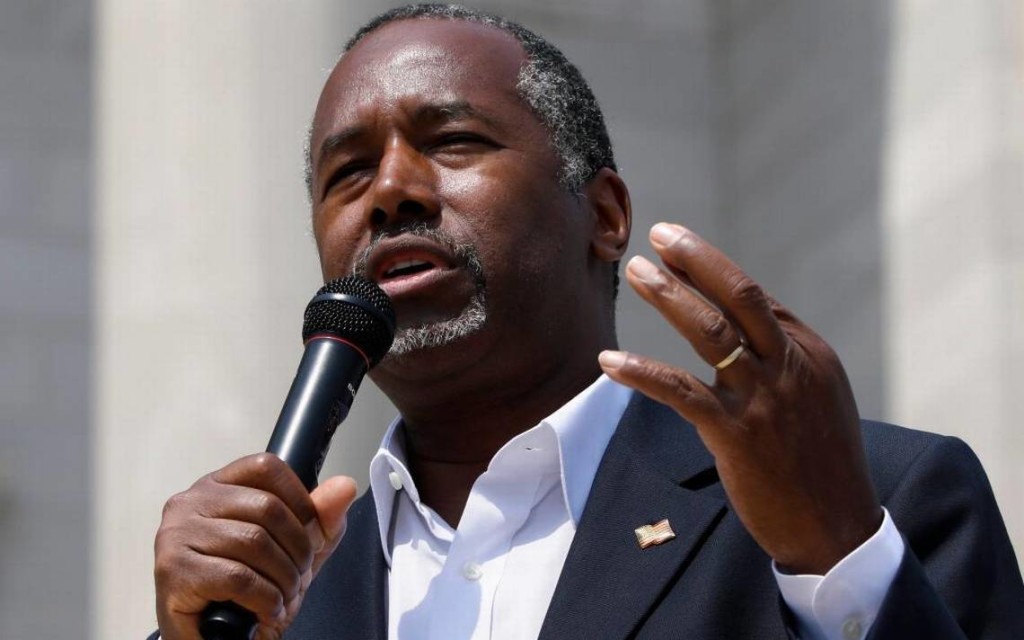
At 27 percent nationally, Donald Trump maintains his frontrunner status among Republican primary voters, but Ben Carson is now close behind him, a new CBS News/New York Times poll finds. Carson’s support has risen significantly since early August, from 6 percent then, to 23 percent now, putting him in second place. John Kasich and Carly Fiorina have also seen their support rise in this poll, although both remain in single digits. Some candidates have not fared as well, losing support since August. Jeb Bush (six percent) and Scott Walker (two percent) have now dropped into single digits in this poll. Rick Perry, who announced he was withdrawing his candidacy while the poll was in progress, receives just one percent of Republican primary voters’ backing. Trump appeals to many different types of Republican primary voters – but Carson is now a strong challenger among these groups of voters as well. Trump has a slight edge among the most conservative voters, while the race is close among women and Tea Party supporters. Trump holds a larger lead among men and evangelical voters. And while Trump leads Carson among voters who have not graduated from college, 30 percent to 19 percent, among college graduates, Carson has 29 percent to Trump’s 21 percent. More here.
For GOP candidates, better to be with pope than against him
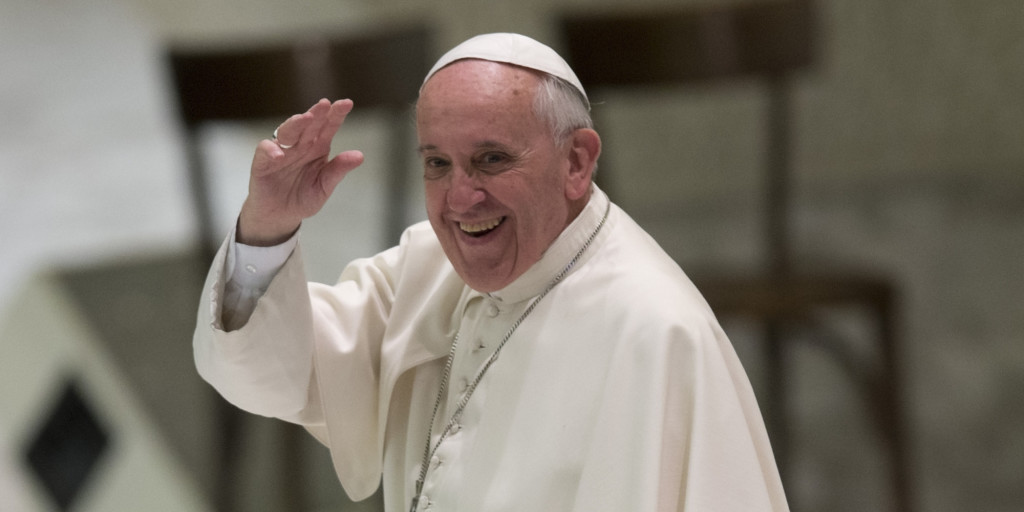
To some Republican presidential candidates, it’s better to be with the popular pope than against him. Marco Rubio, Rand Paul and Ted Cruz have deep policy differences with Pope Francis, but the senators will break off campaign travel to attend his address to Congress later this month, a centerpiece of his eagerly anticipated visit to the United States. Former Florida Gov. Jeb Bush, a devout Catholic, will attend Mass with Francis in Washington. New Jersey Gov. Chris Christie, another Catholic candidate, plans to attend one of the pope’s East Coast events. “Regardless of what the pope says or emphasizes, the simple fact of being associated with his visit is still significant for a candidate,” said David Campbell, a professor at the University of Notre Dame who studies religion and politics. “The images are very powerful.” Francis has become one of the world’s most popular figures since his 2013 election to the papacy, drawing praise for his humility and efforts to refocus the church on the poor and needy. He also has become involved in numerous hot-button political issues, often staking out positions that put him at odds with Republicans. The pope supports the Iran nuclear deal, which many GOP candidates pledge to tear up if they are elected president. As Republicans debate the place of immigrants in the U.S., the pope has urged countries to welcome those seeking refuge and has decried the “inhuman” conditions facing people crossing the U.S.-Mexico border. Francis was also instrumental in secret talks to restore diplomatic relations between the U.S. and Cuba, a rapprochement the GOP views as a premature reward for the island’s repressive government. In a heated primary where any break from party orthodoxy is a political risk, Republican candidates have stepped gingerly around their differences with Francis. When Francis issued an encyclical this year calling for aggressive international action to combat climate change, most Republicans made clear they had no problem with pope taking a position on the matter. But they suggested his stance would have little influence on their own views. “He is a moral authority and as a moral authority is reminding us of our obligation to be good caretakers of the planet,” Rubio, a practicing Catholic, said at the time. “I’m a political leader and my job as a policymaker is to act in the common good.” Bush, who was raised Episcopalian and converted to Catholicism as an adult, said it was best to leave climate change in the realm of politics, not religion. During a campaign stop Thursday in New Hampshire, Bush called the pope an “amazing man” and welcomed his emphasis on mercy and compassion. “I think he’s going to lift people’s spirits up,” Bush said about the pope’s visit to the U.S. “We’re in a time where there’s a lot of vulgarity and a lot of insults and a lot of just coarseness in our discourse. I’m not talking about politics, either. I’m talking about everyday life. “And here’s a man who comes with a gentle soul and I think it might be really healthy for our country to hear someone speak the way he does.” Not all GOP candidates plan to attend events with the pope. Among them are Wisconsin Gov. Scott Walker, whose spokeswoman said he didn’t expect to be in Washington during Francis’ visit, and Rick Santorum, the former Pennsylvania senator and devout Catholic, who was scheduled to be on a campaign trip to Iowa. American politicians have long struggled with how to balance their policy positions with the views of the Vatican. For Democrats, the focus has often been on the gulf between the party’s support for abortion rights and the church’s stern and contrary view. After John Kerry, a Catholic who backs abortion rights, captured the Democratic nomination in 2004, a top Vatican official issued a statement saying priests must deny Communion to politicians who hold that position. Francis has taken a more conciliatory tone on abortion, as well as homosexuality, but hasn’t changed church doctrine. President George W. Bush found himself at odds with the Vatican over the Iraq war. Both Pope John Paul II and his successor Benedict XVI vehemently opposed the war, yet each met Bush during their tenure. Charles Camosy, a theology professor at Fordham University, said that in interactions between politicians and popes, “politics is put aside and there’s respect shown.” Still, the timing of the pope’s visit — in the heart of fall primary campaigning — and his own schedule will make politics difficult to avoid. Francis will hold an Oval Office meeting Sept. 23 with President Barack Obama, who has highlighted areas where his agenda overlaps with the pope’s priorities, including income inequality. The pope will speak the following day on Capitol Hill, where at least some of the focus will be on the reaction to his remarks from the presidential candidates sitting in the audience. The pope’s message in Washington is expected to touch on some of the issues that are sources of disagreement with Republicans, though it’s unlikely he will insert himself directly into presidential politics. Still, as Campbell, the Notre Dame professor, noted, “One thing we’ve learned about Pope Francis is that he’s very unpredictable.” Republished with permission of the Associated Press.
What to watch for in the Republican 2016 race this fall
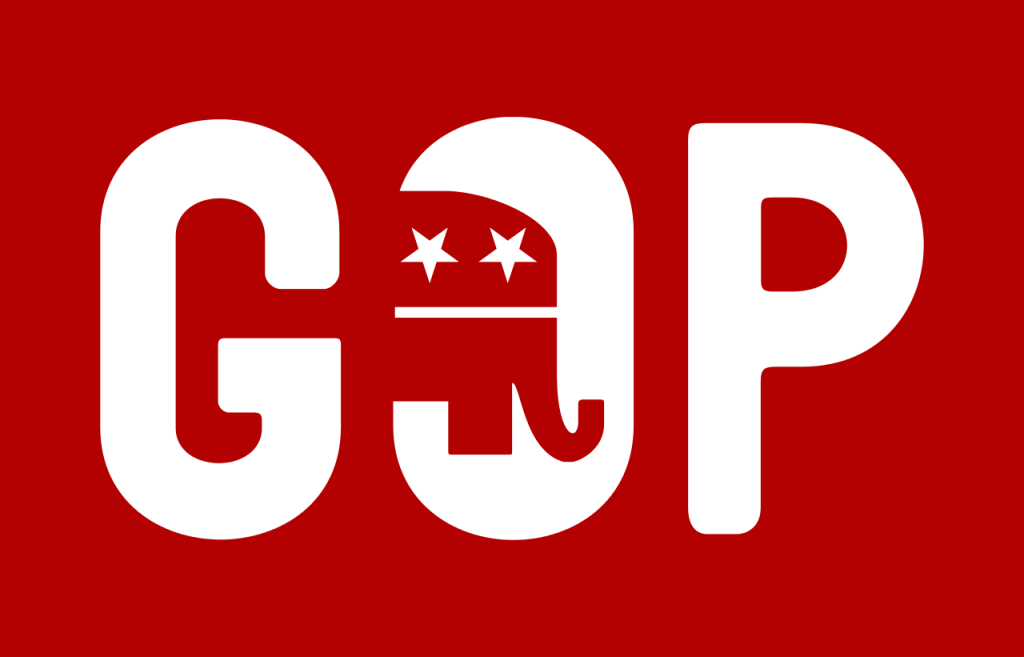
It was a chaotic summer for the unruly pack of 17 major Republican presidential contenders. Surges and slides. Millions of dollars raised and spent. Policy debates, insults hurled. Labor Day marks a new phase in the campaign, when voters traditionally start paying closer attention and the candidates sharpen their strategies. With Iowa voters set to open the primary voting calendar in less than five months, look for the candidates to take their voter outreach to the next level, both on television and direct campaigning. In a field this large, there will be no shortage of story lines to monitor in what could be the most wide-open Republican primary season in a generation. Some things to watch from Republicans this fall. ___ TRUMP TRUMP TRUMP Donald Trump rocketed into front-runner status and has shown remarkable staying power. Can he keep it up when voters start paying more attention? Political veterans in both parties are skeptical, yet the billionaire businessman has repeatedly proved the conventional wisdom wrong. A public relations master, the former reality television star aims to continue dominating the GOP debate as his competitors struggle for attention. ___ WHAT CAN $100 MILLION DO? Trump may be leading the polls, but many Republican officials still consider former Florida Gov. Jeb Bush the most likely candidate to win the nomination, if only because of his massive bank account. Bush faces sinking poll numbers, frustrated donors and growing questions about his campaign strategy. The good news? His campaign and allied super political action committee have yet to spend very much of their $100 million fundraising haul on advertising. That’s about to change. In September alone, Bush and his allies plan to spend more than $20 million on a national advertising campaign. Bush aides insist they’re not panicking about his summer slump. If the September advertising blitz doesn’t help his numbers, they may start. ___ WHO WILL BE THE FIRST TO LEAVE It’s only a matter of time before the field begins to narrow. Who will be the first to go? Speculation has begun to swirl around former Texas Gov. Rick Perry. He stopped paying the majority of his campaign staff in August because of fundraising difficulties. Yet like many candidates, Perry has an allied super PAC that has raised millions of dollars to help keep him going. Some also think Kentucky Sen. Rand Paul may be considering an early exit to focus on his re-election to the Senate next fall. It wouldn’t be a surprise to see one of the lower-tier candidates get out, among them former New York Gov. George Pataki and former Virginia Gov. Jim Gilmore. ___ TONING IT DOWN Led by Trump, several candidates have spent the summer offering harsh rhetoric against immigrants who are in the country illegally. The strong language comes in defiance of the GOP’s recommendation after a disastrous 2012 election to embrace a softer tone on the issue. Trump may have generated the most attention when, in his campaign announcement speech in June, he described Mexican immigrants as criminals and “rapists.” But most of his rivals are demanding a wall along the Mexican border and many are challenging “birthright citizenship.” Even Bush, whose wife was born in Mexico, embraced the term “anchor babies.” If the GOP doesn’t change its tone, the party may struggle to win swing states with surging Hispanic populations, such as Colorado and Florida, no matter who’s on the ticket. ___ BREAKING THROUGH Everyone likes an underdog story, and with a Republican field this large and talented, it’s only a matter of time before someone exceeds expectations. Wisconsin Gov. Scott Walker, Florida Sen. Marco Rubio and retired neurosurgeon Ben Carson already have shined for a time. Will they surge again? Will another candidate emerge? New Jersey Gov. Chris Christie has elite political skills. Former technology executive Carly Fiorina exceeded expectations on the night of the first GOP debate. Tea party firebrand Ted Cruz, a Texas senator, may be in line to inherit some of Trump’s following should Trump start to slip. Republished with permission of The Associated Press.
Ben Carson campaign reaping cash as he rises in GOP polls
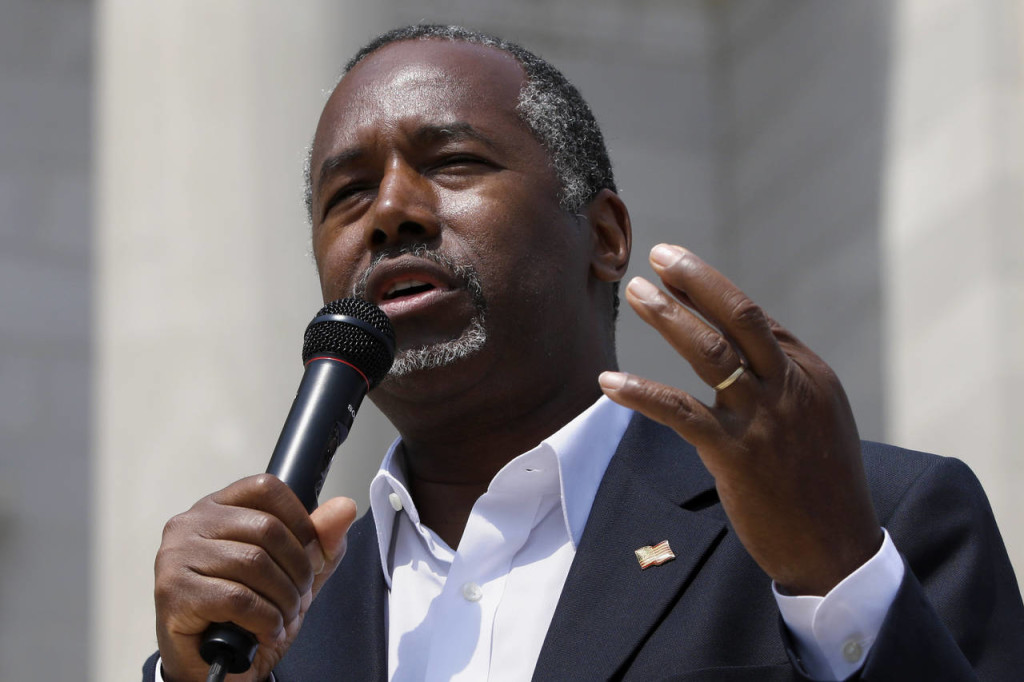
Vacation-filled August is typically one of the worst months for any politician to raise money. But it was Ben Carson‘s best yet. The political novice, a retired neurosurgeon seeking the 2016 Republican presidential nomination, raised $6 million, doubling his July total, his campaign told The Associated Press on Tuesday. Carson’s supporters have handed over roughly $20 million since he began raising money in March, making him a fundraising standout in a sprawling field of 17 Republican contenders. He enters the fall well-funded and rising in the polls, having carved out a niche as the mild-mannered version of bombastic Republican front-runner Donald Trump. Both appeal to voters – and small donors – who reject politics as usual. The doctor’s campaign is unusually reliant on small donors when others have turned to super PACs for million-dollar checks. Trump, a multibillionaire, is largely paying his own way. Of Republican and Democratic presidential candidates, only Vermont Sen. Bernie Sanders has a higher percentage of small contributions, defined as $200 or less per election cycle, than Carson. The dollars have arrived through innovative marketing campaigns and brisk sales of swag. “Carson for president” ball caps have netted $700,000 and individually numbered lithographs of the doctor an additional $500,000. A 90-page abridged version of Carson’s best-selling book “Gifted Hands” has sold 47,000 copies at $20 apiece. Even Carson’s campaign bus – dubbed the “Healer Hauler” by his fans and given its own Twitter handle (@healerhauler) – became a fundraising opportunity. The vehicle will soon be adorned with the names of some 4,000 children whose parents each paid $50 for the privilege. Carson turns his attention to traditional political fundraising this month, as he attends 25 events across the country where price of entry starts at $1,000. And a trio of pro-Carson super PACs and a nonprofit policy group in recent days got a boost when it became legal for his former campaign manager, Terry Giles, to coordinate their efforts. By law, Giles had to “cool off” for 120 days before joining the outside groups, which unlike the campaign, can accept donations of unlimited size. Carson posted strong initial fundraising numbers when his campaign filed its first two reports this year. Through the end of June, no Republican campaign had raised more except former Florida Gov. Jeb Bush and Texas Sen. Ted Cruz. (Govs. Scott Walker, John Kasich and Chris Christie hadn’t been in the race long enough to file reports at the time.) Carson’s money is paying for about 50 campaign employees and an intense travel schedule for the candidate. Campaigns aren’t due to file their next fundraising reports, covering July through September, to federal regulators until mid-October. Most have been reluctant to share summer fundraising totals. Republished with permission of the Associated Press.
In new web ad, Scott Walker takes a shot at Jeb Bush on Iran deal
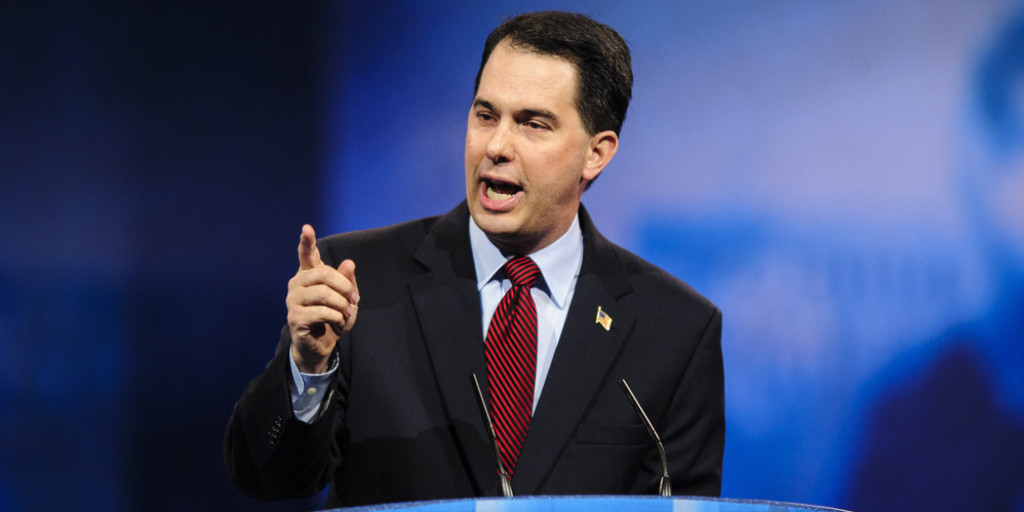
Jeb Bush opposes the proposed nuclear agreement between the U.S. and Iran. He’s made that quite clear, as has every other Republican running for president. Unlike the others though, Bush said that he may not tear the deal up on “Day One” of his presidency. “At 12:01 on January, whatever it is, 19th [2017], I will not probably have a confirmed secretary of state; I will not have a confirmed national security team in place; I will not have consulted with our allies. I will not have had the intelligence briefings to have made a decision,” Bush said in a foreign policy speech in Carson City, Nevada. “If you’re running for president, I think it’s important to be mature and thoughtful about this.” That line was considered a rebuke to Wisconsin Governor Scott Walker, who days before during his speech announcing his candidacy said that, “We need to terminate the bad deal with Iran on the very first day in office.” Walker hits back in a new web ad, with footage from a campaign speech where he says, “Unlike others, I don’t need months, or years to hold this over. If Congress fails to stop the nuclear deal, I will terminate it on day one.” “America will not be intimidated,” he says later in the ad. “And neither will I.”
Presidential Primary Brief: 435 days until Election Day
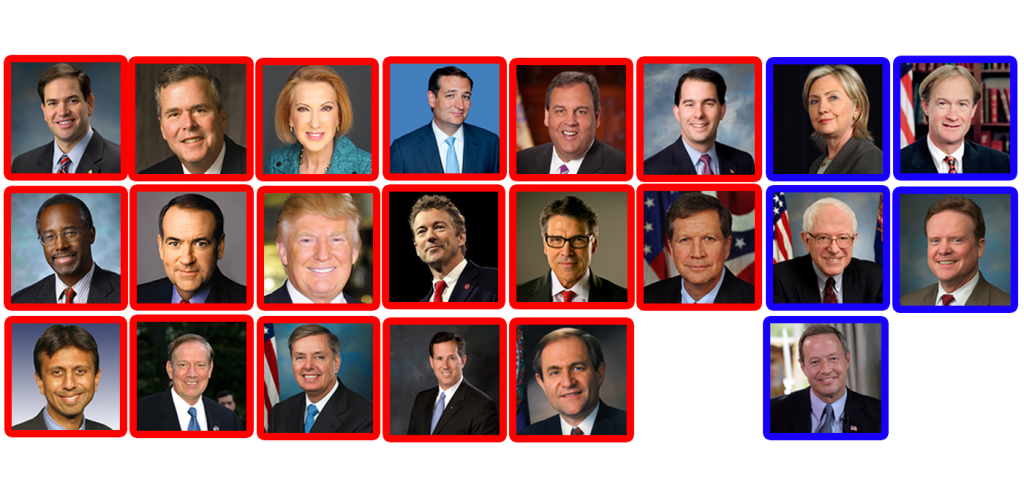
181 days until AL Presidential Primary 435 days until Election Day Convention Dates: Republican July 18-21 2016, Democratic July 25-28 2016 Weekly Headlines: Hillary Clinton summons top campaign bundlers to New York Poll: Biden outperforms Hillary in general election; Trump leads GOP field Rick Perry presidential run on death watch Press Clips: Scott Walker to outline foreign policy blueprint (NBC News 8/28/15) After a week of calling on the White House to cancel next month’s state visit for the Chinese president, Wisconsin Gov. Scott Walker will lay out his own foreign policy blueprint, laying out a plan to take on terrorism and saying “America will not be intimidated.” During a speech to cadets at the Citadel in South Carolina, Walker will continue his attacks against what he has called the “Obama-‐Clinton” foreign policy, calling it filled with “delusion and wishful thinking,” according to excerpts released by his campaign. Huckabee lands Aaron Trost as Iowa director (Politico 8/27/15) Former Arkansas Gov. Mike Huckabee will announce Thursday that Aaron Trost, who managed the insurgent campaign of Sen. Deb Fischer (R-‐Neb.), will be his Iowa state director. Trost comes to Iowa after making his name in neighboring Nebraska, where he engineered a come-‐from-‐behind primary victory for Fischer in 2012, then managed her general-‐election victory over former Sen. Bob Kerrey. Gov. Dan Malloy questions Sanders’ stance on guns (Politico 8/26/15) Connecticut Gov. Dannell Malloy questioned Bernie Sanders’ record on gun control during a meeting Tuesday with New Hampshire organizers for Hillary Clinton’s campaign. Campaigning for Clinton in the Granite State, the Democratic governor contrasted the former secretary of state’s record on guns with that of the independent Vermont senator, according to a report from Hearst Connecticut Media Group. Carly Fiorina’s camp cries foul in attempt to get on debate main stage (Politico 8/26/15) Faced with the very real possibility that she will again be relegated to a lower-‐tier debate, GOP presidential candidate Carly Fiorina’s campaign is going after the Republican National Committee and the news organization the RNC picked to host the next debate, CNN. Fiorina has surged in the polls since a widely praised performance in the “happy hour” debate earlier this month. But she has a problem: There haven’t been enough polls to catapult Fiorina from 14th place, where she stood going into that debate, into the top 10 ranking for CNN’s Sept. 16 debate. Donald Trump’s newest media brawl (Politico 8/26/15) The Univision anchor in the front row of Donald Trump’s pre-‐rally news conference in Iowa on Tuesday night piped up to ask a question as the Q&A began. Then Jorge Ramos quickly became the surprise star of the news cycle, the latest to present itself in Trump’s unapologetic, take-‐no-‐prisoners spectacle of a campaign. “Mr. Trump, Mr. Trump!” said Ramos, one of the country’s most influential Hispanic journalists. “Sit down, sit down. You weren’t called,” Trump responded gruffly. As stock market drops, so do Hillary’s chances (Politico 8/25/15) U.S. stocks continued their sharp decline on Tuesday, fueling talk of a worst-‐case scenario for both Wall Street and the broader U.S. economy heading into 2016. And it is one that could make it all but impossible for Hillary Clinton or any other Democrat to win the White House. Under this scenario, a further collapse in China reignites fear in U.S. markets. A strengthening dollar hurts exports while job growth, which is already slowing, stalls out completely. Meanwhile, Janet Yellen and the Federal Reserve make a huge policy mistake and raise interest rates too soon, choking off what little growth we have. Tom Vilsack endorses Hillary Clinton (Politico 8/25/15) Hillary Clinton scooped up a key endorsement from the Obama administration’s agriculture secretary on Tuesday. Tom Vilsack, a former Iowa governor who had a brief run in the 2008 campaign, endorsed the Democratic front-‐runner in an op-‐ed in the Cedar Rapids-‐based Gazette. Vilsack said he will proudly caucus for Clinton and praised her record on the economy, energy and education.
Presidential TV ad roundup: August 28 edition

Here’s a roundup of all the Presidential TV ads from this past week: Jeb Bush Title: Fighting for Conservative Education Reform Published: August 20, 2015 Tone: Confident Title: Catastropic Published: August 24, 2015 Tone: Cynical and doubtful Title: Hurricane response Published: August 25, 2015 Tone: Straightforward Title: Transparency vs Secrecy Published: August 27, 2015 Tone: Honest Title: For our veterans Published: August 28, 2015 Tone: Respectful and optimistic Ted Cruz Tone: Stand for religious liberty Published: August 25, 2015 Tone: Disappointed but hopeful Scott Walker Title: Talk vs. Action: On Planned Parenthood Published: August 16, 2015 Tone: Accomplished Martin O’Malley Title: Join Us to Rebuild the American Dream Published: August 25, 2015 Tone: Self-assured
Daniel Sutter: Will public universities privatize?
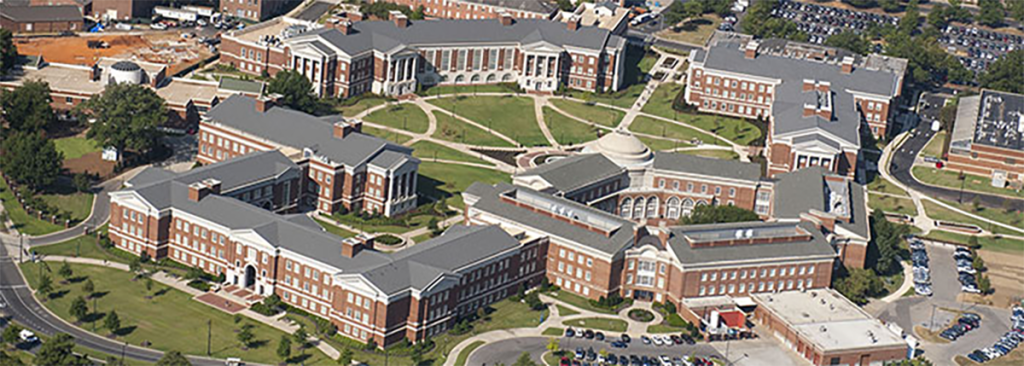
Many government services have been privatized over the past forty years, from whole enterprises like British Airways to simply contracting with private businesses for services like trash collection and operating cafeterias. My corner of the world, public universities, has witnessed only service privatization, but this may change. And in contrast with cases where conservative politicians have driven privatization, I suspect that a public university will decide to go private. Declining state appropriations for higher education represents the driving factor here. Speculation by higher education observers centers on three leading state universities, Michigan, Virginia, and Colorado, which currently receive 10% or less of their operating budgets from state appropriations. (To be clear, none of these universities have privatization plans today.) A university receiving 10% of its budget from the state would only have to cut costs by 5% and increase other revenues by 5% one time to take state funding to zero. I suspect that administrators can imagine how they might make such cuts and revenue increases. State appropriations to higher education have been falling as a share of government spending and university budgets for 50 years. For instance, the University of Michigan received 80% of its budget from the state in the 1950s. State appropriations fell from 46% to 36% of public university budgets nationally between 1977 and 1996. Appropriations have declined another 16% nationally since 2008 (25% here in Alabama), according to data from Illinois State University. State appropriations now provide less than 20% of the budgets of Troy University and the University of Alabama. Universities remain under state control despite diminishing financial support. For example, Governor Scott Walker and state legislators cut appropriations to the University of Wisconsin by $250 million this year, but also froze university tuition and revoked state law protection for faculty tenure. Eventually administrators and faculty at some state university will decide that state funding is not worth the control, and elected officials will jump at the chance to cut the remaining spending. Reduced state support has coincided with a rapid increase in tuition. Net tuition (posted tuition minus university scholarships and financial aid) at public universities has increased 54% faster than inflation over the past twenty years. State appropriations cannot be blamed for all of this, since net tuition has increased 29% faster than inflation at private universities. The relative quality of flagship state universities has also declined. Fifty years ago, Michigan, Virginia and Wisconsin, along with the Universities of California at Berkeley, Minnesota, Illinois, and North Carolina were among the nation’s top twenty universities. Only one public university made the U. S. News and World Report top twenty in 2014. Federal student aid and Medicaid have dramatically shaped state budgeting since 1965. Medicaid operates under a matching grant formula, under which states receive between $1 and $3 from the Federal government for every $1 they spend on Medicaid. But if states reduce spending on higher education and let tuition rise, many students will receive more Federal aid for students. Lawmakers can bring more federal dollars to their states by shifting appropriations from higher education to Medicaid. Over the last fifty years, Washington has asserted increasing control over state universities. Eligibility for Federal student aid requires compliance with U.S. Department of Education regulations and maintenance of regional accreditation. Any new tax dollars for higher education seem likely to come from Washington as well. President Obama’s free community college plan would rely on Federal dollars. Federal control, I think, is bad for higher education. Competition is the greatest force for ensuring performance, and state-run universities will naturally compete. North Dakota has increased higher education appropriations by 26% since 2008, using oil revenues to gain a competitive edge for the state’s universities. State control allows for experimentation and diversity, which is particularly valuable in scholarly fields. Our state universities have provided millions of people access to a quality education at an affordable price. But state lawmakers providing less funding while insisting on as much control as ever seems unsustainable. Our public universities appear destined to become “state” in name only. Daniel Sutter is the Charles G. Koch Professor of Economics with the Manuel H. Johnson Center for Political Economy at Troy University and host of Econversations on TrojanVision.
Senate Majority Leader Greg Reed to be Scott Walker’s state campaign chairman
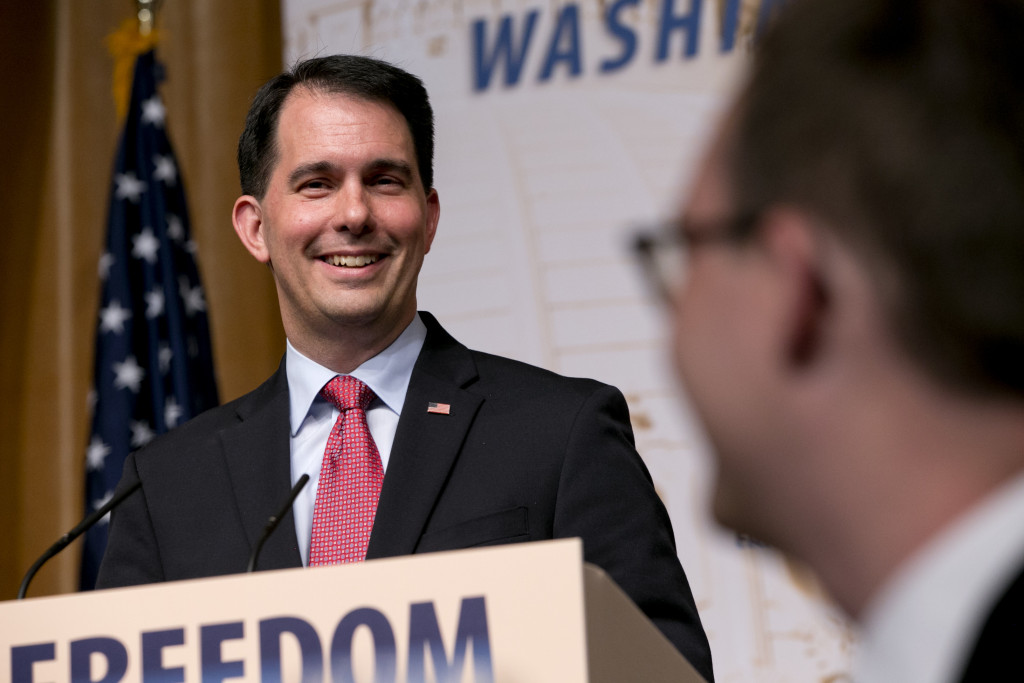
The presidential campaign of Wisconsin Gov. Scott Walker has recruited Republican Senate Majority Leader Greg Reed as its state chairman for Alabama, according to a Howard Kopolowitz report on AL.com Friday. The announcement comes as Walker is scheduled to visit Alabama on Saturday to address the state Republican Party’s annual Summer Luncheon, held at the Talladega Speedway. Walker is also slated to visit the famed Dreamland Bar-B-Que in Birmingham. Reed, a second-term Republican from Jasper, has served in the Legislature since 2010 and has quickly risen to the ranks of leadership within the state Senate. Besides his role as Majority Leader, Reed, a former health care executive, is the deputy chairman of the Senate’s Health and Human Services Committee. He also sits on the powerful Rules committee, as well as Banking and Insurance, Judiciary, and Transportation and Energy panels. Reed endorsed Newt Gingrich’s ill-fated bid for president during the 2012 election cycle. Gingrich finished a close second in the Alabama primary, garnering 29.3 percent of the vote as Pennsylvania Sen. Rick Santorum won the state with 34.5 percent. Alabama could take on increased importance in the national GOP primaries since the state adopted a proposal during the last legislative Session to become part of the so-called “SEC primary,” joining with states such as Tennessee and North Carolina to become one voting bloc, in part to counteract the influence of early-voting South Carolina.
Rand Paul: A humanitarian in Haiti, a pit bull in 2016

Even while fighting blindness in the poorest nation in the Western Hemisphere this week, Republican presidential contender Rand Paul intensified political attacks against rivals in both parties, vowing to continue pressing billionaire businessman Donald Trump in particular as the Kentucky senator embraces the role as the GOP’s leading pit bull. An ophthalmologist by training, Paul left Haiti on Wednesday afternoon after spending four days on a humanitarian mission to the island nation. From a small urban clinic guarded by a team of armed police, Paul joined six eye surgeons who restored vision to dozens of impoverished Haitians, many living for years in blindness because of ailments such as cataracts that are easily treated in the United States. The trip offered the tea party firebrand a brief respite from a presidential campaign in which his standing has slipped substantially in recent weeks. Yet the 2016 election — especially Trump — was a regular topic of conversation when Paul wasn’t in the operating room. “His candidacy is an insult to the intellectual movement that has called for small government for decades,” said Paul, wearing operating room scrubs, in an interview with The Associated Press shortly before returning to surgery Tuesday morning. He described the reality star’s candidacy as “buffoonery” and promised to continue leading the anti-Trump charge “until he fades away.” This week’s Haiti trip was organized by the University of Utah’s Moran Eye Center, an institution that organizes regular missions to combat “curable blindness” in developing nations around the world. Paul participated in a similar mission with the same group last summer in Guatemala. While the trip was not technically part of Paul’s presidential campaign, he invited a small number of political journalists and at least one prominent donor to join him this week. Due to security concerns, his team asked that reporting of the trip be restricted until Paul left the country. His team helped raise at least $70,000 for the eye center before the trip. One of the benefactors was Trump himself, who donated $10,000 to the university at Paul’s request roughly two months ago. That was shortly before Paul began aggressively challenging Trump’s conservative credentials. “No one is pure evil,” Paul said of Trump when asked about his contribution. “He has some redeeming qualities.” Paul arrived in Haiti on Sunday aboard the private jet of Republican donor Gary Heavin, the Texas-based founder of the Curves fitness center franchise. He and his wife were at Paul’s side for much of the week. Heavin, who has been active in Haitian charity work since a 2010 earthquake devastated the capital city, said he’s yet to decide whether to support Paul formally, but he’s already ruled out the other candidates. “If I support anyone in the Republican Party, it’s him,” Heavin said in an interview on a bustling street outside the eye clinic. He said he has the capacity to donate more than $10 million and would back Paul if Heavin is “confident in his ability to influence the process.” Paul, meanwhile, is betting that he can influence the process best by being aggressive. He condemned Democratic presidential candidate Hillary Rodham Clinton, whose family foundation has raised more than $30 million for Haiti since the 2010 earthquake. “To me the most disgusting thing about the Clinton foundation is almost none of their money went to charity,” Paul said, suggesting that only 6 percent of the Clinton Global Initiative’s revenue went to charitable grants. A spokesman for the organization didn’t respond to a request for comment. The group previously said grants make up only a small fraction of its charitable work, which is largely handled by staff. Asked about Wisconsin Gov. Scott Walker‘s recent criticism of Washington-based Republicans, Paul charged, “Part of problem we have is career politicians like Scott Walker.” “Has he ever had a job outside of politics?” Paul went on. “He was running for office when he was in college. I’m not going to be lectured by a career politician, that’s for sure.” And on Chris Christie, Paul noted that the New Jersey governor exaggerated his role in the response to the 9/11 terrorist attacks during the recent GOP debate. “People wrap themselves in tragedy so they don’t have to argue the point,” Paul said of Christie. Paul said he had little choice but to go on the attack to stand out in the crowded race. “Right now, people are choosing theatrics over substance,” he said. “And so, you just have to compete in the arena the way the arena is arranged.” Republished with permission of the Associated Press.
Donald Trump leads Jeb Bush 24% -13% in new CNN national poll

A CNN/ORC national poll released Tuesday morning shows that even after his uneven performance at the first GOP debate and subsequent controversy with Fox News’ Megyn Kelly, Donald Trump remains the dominant candidate in the Republican presidential race, getting 24 percent of the vote. Jeb Bush is second with 13 percent. Retired pediatric neurosurgeon Dr. Ben Carson is third with 9 percent. Marco Rubio and Scott Walker are next at 8 percent. Rand Paul is at 6 percent. Ted Cruz, Carly Fiorina and John Kasich are at 5 percent, and former Arkansas Governor Mike Huckabee is in tenth place with 4 percent. Bush has seen his favorability ratings drop since Trump’s entry into the race. He held the top spot in the field in most CNN/ORC polls between last fall and Trump’s entry into the race in June. Overall, 56 percent hold an unfavorable view of the former Florida Governor, and 42 percent of Republican voters have a negative impression. That’s an increase in negative views among all adults (up from 43 percent since July) and among Republican voters (up from 34 percent unfavorable). As has been the case with Trump in most polls since he surged to the lead in every poll taken over the past month, there are still downsides for the New York City businessman/celebrity. A majority of Republicans – 58 percent – say the party would have a better chance to win in 2016 with any candidate other than the former Celebrity Apprentice star being the nominee – and that’s the case with 72 percent of those who currently aren’t supporting Trump. However the pollsters say that Trump is impressing on a variety of other questions asked in the survey. The poll shows that 45 percent say that they trust Trump more than any other Republican candidate on the economy — up 25 points since June, 44 percent say they trust Trump over the others on illegal immigration — up 30 points since June — and 32 percent trust him most to handle ISIS, no other candidate comes close on any of these issues. On the economy and illegal immigration, Trump is far and away the top choice even among those Republicans who support someone else for the nomination (33% who say they will most likely vote for someone else say Trump is their most trusted on the economy, 29% say so on illegal immigration). Trump is also most trusted on social issues, 19% say he’s their top choice to handle that. Bush follows at 15%. The CNN/ORC Poll was conducted by telephone Aug. 13-16 among a random national sample of 1,001 adults. The sample included 466 registered voters who are Republicans or independents who lean toward the Republican Party. For results among those Republican voters, the margin of sampling error is plus or minus 4.5 percentage points. For results among the full sample, it is 3 points.
GOP hopeful Scott Walker offers health plan with tax credits
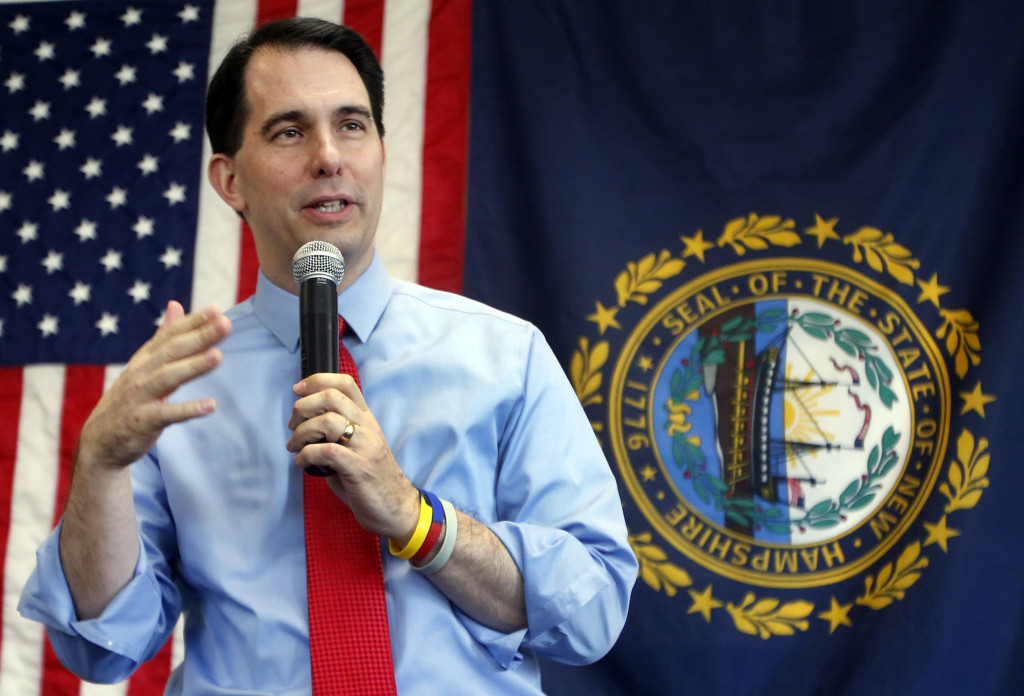
Republican presidential candidate Scott Walker‘s plan for replacing President Barack Obama‘s health care law would extend refundable tax credits to help pay for private health insurance based on age instead of income, restructure Medicaid and allow people to shop for insurance across state lines. The Wisconsin governor provided details of his proposal to The Associated Press in advance of a Tuesday speech in suburban Minneapolis where he was to outline his first major policy initiative of the presidential campaign. Walker’s plan does not include cost figures or an estimate of the number of people who would be covered, making it nearly impossible to compare with current law. For the period from April to June of this year, 11.4 percent of U.S. adults were uninsured, which translates to about 16 million people gaining coverage since the rollout of Obama’s health care law in 2013. Walker’s campaign said the plan would be paid for by eliminating $1 trillion in taxes that are levied under the current law and by making other changes to Medicaid and how health insurance is taxed. The Supreme Court in June upheld a key portion of the Affordable Care Act allowing for federal subsidies to defray the cost of coverage, a major defeat for opponents of the law. Walker and other Republican candidates have insisted they would repeal the law, starting on the first day of a GOP presidency. The biggest hurdle Walker, and any opponent of the law, faces is getting it repealed. That would take 60 votes in the Senate, and Walker’s plan does not address how he would undo the law in any other way. Walker, in excerpts of his speech released by his campaign, blamed fellow Republicans with not doing enough to repeal the law. “Republican leaders in Washington told us during the campaign last year that we needed a Republican Senate to repeal Obamacare,” Walker said in the prepared remarks. “Well, Republicans have been in charge of both houses of Congress since January and there still isn’t a bill on the president’s desk to repeal Obamacare.” Topher Spiro, vice president for health policy at the Center for American Progress, a think tank often aligned with the White House, said Walker’s plan would be a step backward. “The math only adds up if he’s slashing Medicaid and increasing taxes on middle-class people with employer plans,” Spiro said. While the Walker plan would repeal the Affordable Care Act, it appears to use some similar kinds of tools to promote coverage. For example, there would be no requirement for individuals to carry health insurance or face fines, as there is currently. But, in order to be guaranteed affordable coverage without regard to pre-existing medical problems, individuals would have to “maintain continuous, creditable coverage.” There’s merit to Walker staking out his position on the issue, even though he doesn’t explain how the law would be repealed, said economist Douglas Holtz-Eakin, president of the American Action Forum, a center-right think tank. “There’s a lot of this that is fairly standard conservative health policy reform,” Holtz-Eakin said. “The basic plan looks familiar.” Walker, similar to current law, would also provide tax credits to help with the cost of coverage for people whose employers don’t offer insurance. But unlike current law, those credits of between $900 and $3,000 would be based on age and not be keyed to a person’s income. So they may not help low- to moderate-income people as much as the existing tax breaks do. Walker’s plan calls for eliminating unspecified regulations in the current law, a move that Walker claims would lower premiums by 25 percent. Other elements of the plan would include extending a $1,000 refundable tax credit for anyone who signs up for a health savings account, allowing people to shop for health insurance across state lines, reorganizing Medicaid into smaller programs, and giving states more regulatory authority. He would also allow for new health insurance purchasing agreements and deregulate the long-term care insurance market. The reality of outright repealing the law as Walker wants to do is stark: Doing away with it completely would kick 19 million people off insurance in the first year, according to the Congressional Budget Office. Walker isn’t the first Republican to put forward a detailed plan for replacing Obama’s law. Louisiana Gov. Bobby Jindal released his plan last year and Florida Sen. Marco Rubio outlined his approach in an opinion piece published Monday. And while alternatives have been introduced in Congress, none has gotten traction as Republicans have yet to coalesce around any particular idea. Republished with permission of The Associated Press.


